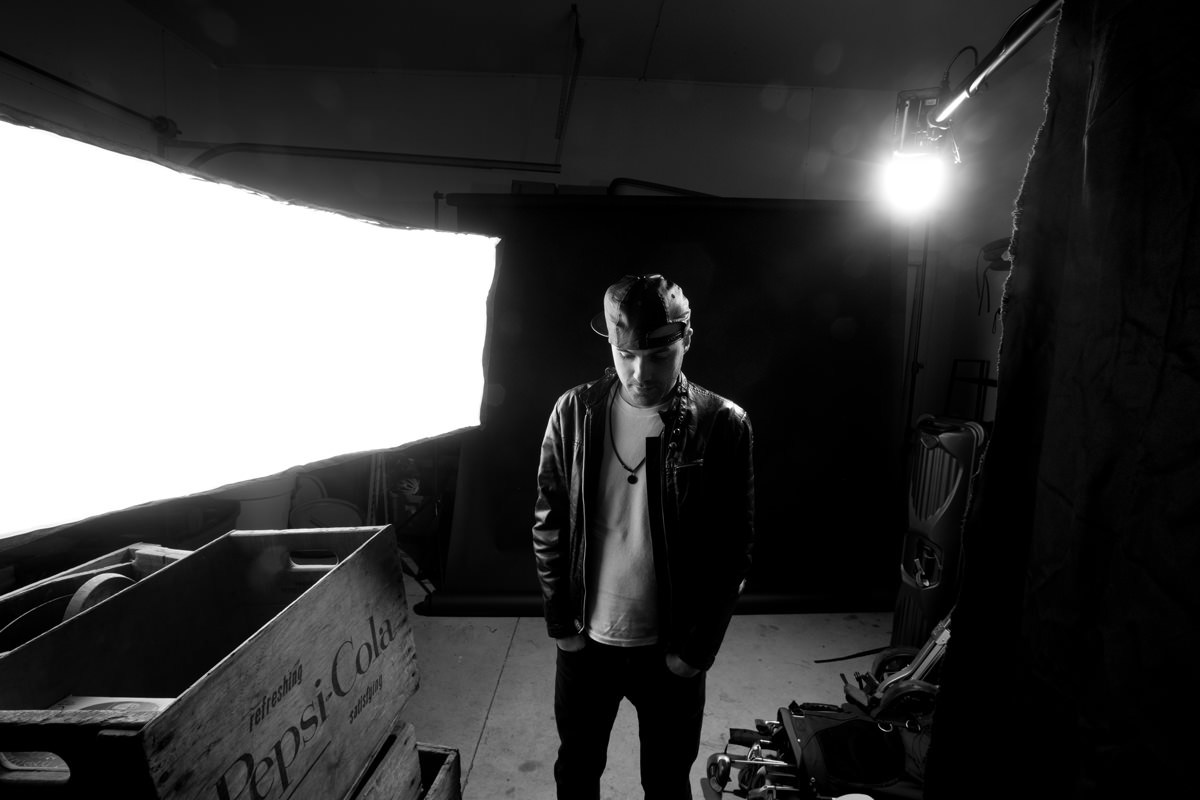
Coming full circle.
From student to teacher, singer, songwriter, and producer Ango returns to help nurture a the next generation of producers in Montreal.
Andrew Gordon Macpherson, aka Ango, is a Nova Scotian who once made Montreal his home before settling into Toronto. With his extensive musical knowledge and exceptional vocals, this R&B singer and beatmaker brings a unique quality to his music. The young phenom has grown into his style since we last sat down with him in 2011.
The timing of that interview was memorable in that it came right after Ango completed the program at the Red Bull Music Academy and just before he jetted off to the 2011 RBMA showcase tour/workshop series. His career has only exploded since, joining some music industry greats on stage and in studio. Throughout this whole process he has taken away one major lesson: be yourself.
We got a chance to catch up with Ango when he recently returned to Montreal, this time on the flip side of the RBMA workshops. Back in 2010, Ango was a student at the RBMA in London. Today, Ango has proved himself as a musician, and as a graduate of the academy, he was asked to teach the new crop of emerging artists at the 2015 RBMA Bass Camp in Montreal. Get to know Ango as he recalls his growth as an artist.
WRG: When was the moment you realized you had grown into your own musical style?
Ango: I think it was just after the RBMA in 2010. I had done the first draft of my LuckyMe record (Another City Now) and I felt like it was me but it lacked that distinguishable sound. I decided to remake the record with only my voice and the sounds from one synth and one drum machine. Limitation became “style.” Once I limited my palette, my voice could shine through over the body of work. Now my challenge is making that voice clear in different musical projects where I play different roles.
How do you think the music industry has changed over the last couple of years?
It’s moving really fast. All these artists and micro-genres happening on their own on the Internet is really fun to take in. Anything “industry” is still dreadfully slow and clogged up with people who don’t make decisions very well. They don’t really make many new “stars” anymore. It’s pretty obvious that the Internet changed everything – how we think about music and our relationship to the people who make it – but we’re all in a holding pattern waiting to see how that best reinvents itself.
Growth in the music industry is unpredictable. How do you keep up?
Keep learning but stay true to your own vision and try to offer something new to the conversation about genre or software workflow or journalism or videos or whatever your medium is. I think it’s good to reinvent yourself and contribute to the conversation, but be yourself.
What do you think are the positive and negative types of growth impacting music culture?
I think artists are becoming more autonomous with their own distribution channels like YouTube and SoundCloud, which is positive growth. But at the same time, we’re losing our means to make income from our work because of ignorance about how all these platforms work and how they can be effective for us. I also believe the superstar DJ/producer realm is getting saturated and people need to think about what sets them apart and start writing songs instead of just “tracks.”
Do you feel that the RBMA helped you grow as an artist?
RBMA helped me grow because it helped me make a lot of new music-loving friends all over the world. That’s the best type of networking: making friends. All the lectures and shows are an invaluable resource but the relationships I’ve developed have actually changed my life.
Andrew Gordon Macpherson, aka Ango, is a Nova Scotian who once made Montreal his home before settling into Toronto. With his extensive musical knowledge and exceptional vocals, this R&B singer and beatmaker brings a unique quality to his music. The young phenom has grown into his style since we last sat down with him in 2011.
The timing of that interview was memorable in that it came right after Ango completed the program at the Red Bull Music Academy and just before he jetted off to the 2011 RBMA showcase tour/workshop series. His career has only exploded since, joining some music industry greats on stage and in studio. Throughout this whole process he has taken away one major lesson: be yourself.
We got a chance to catch up with Ango when he recently returned to Montreal, this time on the flip side of the RBMA workshops. Back in 2010, Ango was a student at the RBMA in London. Today, Ango has proved himself as a musician, and as a graduate of the academy, he was asked to teach the new crop of emerging artists at the 2015 RBMA Bass Camp in Montreal. Get to know Ango as he recalls his growth as an artist.
WRG: When was the moment you realized you had grown into your own musical style?
Ango: I think it was just after the RBMA in 2010. I had done the first draft of my LuckyMe record (Another City Now) and I felt like it was me but it lacked that distinguishable sound. I decided to remake the record with only my voice and the sounds from one synth and one drum machine. Limitation became "style." Once I limited my palette, my voice could shine through over the body of work. Now my challenge is making that voice clear in different musical projects where I play different roles.
How do you think the music industry has changed over the last couple of years?
It's moving really fast. All these artists and micro-genres happening on their own on the Internet is really fun to take in. Anything "industry" is still dreadfully slow and clogged up with people who don't make decisions very well. They don't really make many new "stars" anymore. It's pretty obvious that the Internet changed everything - how we think about music and our relationship to the people who make it - but we're all in a holding pattern waiting to see how that best reinvents itself.
Growth in the music industry is unpredictable. How do you keep up?
Keep learning but stay true to your own vision and try to offer something new to the conversation about genre or software workflow or journalism or videos or whatever your medium is. I think it's good to reinvent yourself and contribute to the conversation, but be yourself.
What do you think are the positive and negative types of growth impacting music culture?
I think artists are becoming more autonomous with their own distribution channels like YouTube and SoundCloud, which is positive growth. But at the same time, we're losing our means to make income from our work because of ignorance about how all these platforms work and how they can be effective for us. I also believe the superstar DJ/producer realm is getting saturated and people need to think about what sets them apart and start writing songs instead of just "tracks."
Do you feel that the RBMA helped you grow as an artist?
RBMA helped me grow because it helped me make a lot of new music-loving friends all over the world. That's the best type of networking: making friends. All the lectures and shows are an invaluable resource but the relationships I've developed have actually changed my life.
Photo Credit: Paul McCurdy
